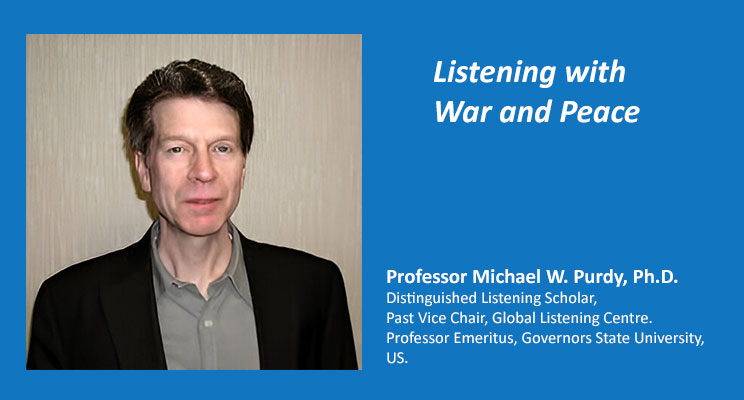
Listening with War and Peace
Professor Michael W. Purdy, Ph.D.
Distinguished Listening Scholar,
Past Vice Chair, Global Listening Centre.
Professor Emeritus, Governors State University,
US.
It might shock the average person to learn that “Between 1946 and 2021, there were more than 500 wars world-wide. Just a quarter of those conflicts ended through peaceful negotiation, and 40% never ended at all. War is reality, and it would seem that life on this earth has not advanced. However, some would argue that the world is a better place in late modern times, despite all the problems. Some argue, as I do too, that the world is better and worse at the same time. That rings true; especially if you are listening to the news, social media or other media outlets. If war is reality, how do we cope with the chaos war invites into our lives?
Mohandas Karamchand Gandhi (1869-1948) is famously said:
“When I despair, I remember that all through history, the way of truth and love has always won. There have been murderers and tyrants, and for a time they can seem invincible. But in the end, they always fall. Think of it, always.”
Ghandi provides a certain relief, but only in a harsh and solemn world.
UN peacekeepers have at times worked to create a listening environment. In the real world we can look to those like UN Peacekeepers who are charged with standing between warring parties; and when workable bringing sides and parties together to talk about common concerns rather than resorting to violence. If they can set the parties down when an issue arises and find a way to get them talking and telling them stories and listening to each other, instead of escalating towards a fight, there is hope of a different outcome. A recent outcome of interpersonal communication found that, nurturing the quality of relationships, even on an objectively small scale, had powerful implications for reducing large-scale tensions, even in situations of war.
There are many ways to start a conversation among participants in conflict. Listening circles, for instance, offer everyone a chance to express frustrations. In listening circles participants in conflict catch the breakdown of listening communication before it escalates—a helpful move. As Yuval Noah Harari writes in his new book Nexus, iv (Pg 30)” since history is shaped by intersubjective stories, sometimes we can avert conflict and make peace by talking with people, changing the stories in which they and we believe, or coming up with a new story that everyone can accept.” And in a listening circle everyone is hopefully in some sense open and receptive. To change the story or create a new one, one must listen carefully to current stories to know what the new story might be.
Many people who knew Gandhi well said he was a very good listener; he listened to know how to respond, to know what action to take. He was master of both listening and strategy, working to change the story regarding colonial powers.
Sometimes peacekeepers, listening circles, and even culturally shared celebrations can dissolve conflicts, and we would all hope for that. But we know from history that humans repeatedly find their way to war or skirmishes instead of talking and listening. Still, there is hope; there are now more organizations and movements promoting listening than at any time in history. And then there is a major force in listening, The Global Listening Centre. This organization held the 2024 Global Listening Festival at the University of Northern Iowa. The announcement lauding the festival’s success, declared “the vital role of listening in enhancing our lives, improving our communities, and creating a vibrant and peaceful global community.”
But in the mayhem that continues to turn to war, the last and most important listening strategy is to “Be the change you want to see in the world” —a quote that’s often attributed to Mahatma Gandhi. This requires turning our listening inwards to find a peace and balance within ourselves.
We must do what we can in terms of peaceful resistance, active and constructive behavior, and then we must listen to self, the self which integrates the dark side, the shadow, as Carl Jung put it, in our civilization. We must listen to self, the whole self and find peace within.
Sri Aurobindo (1872-1950, yogi, seer, philosopher, poet) in The Life Divine, said the most important discovery of the listening self was found in listening to the silence, going within. Kirpal Singh (1894–1974) Indian spiritual master, stressed listening as receptivity, and meditation-going within and advised seekers to “Know thyself.” Michel Foucault (1926- 1984), French philosopher, said “Take care of thyself.” Such wisdom is universal. It can be found by listening in the silence of our everyday life. Listening within us become more stable and contribute in some small way to peace in the world.
There is much more to be appreciated with regards the listening self and listening with silence but that is another article for another day.
References: i Bloomberg Weekend Edition, 11/16/2024 iii https://ourworldindata.org/much-better-awful-can-be-better iii See https://theconversation.com/seven-charts-that-show-theworld-is-actually-becoming-a-better-place-109307 Iv Harari, Yuval Noah. (2024). Nexus: A Brief History of Information Networks from the Stone Age to AI. Random House, New York.
